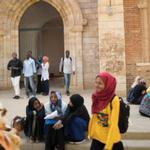How the international community failed Sudan
The Sudanese people wanted a transition fully led by civilians but were let down by an international community pushing for a power sharing agreement that was doomed to fail.
The downfall of Bashir’s regime in April 2019 set into course a tumultuous transition in Sudan, warranting the intervention of the international community in pragmatic ways to address the complex reality in Sudan. Thirty years of autocratic and kleptocratic rule in Sudan tightened the grip of the military on power, weakened state institutions, and widened the cracks of its political class.
After difficult negotiations, the Sudanese interlocutors formed a transitional government based on shaky power sharing between civilians and military leaders who, until 11 April 2019, were part of Bashir’s inner security circle. A political declaration brokered by the African Union emissaries and signed on 17 August 2019 paved the way for the formation of a transitional government made up of a Sovereign Council shared between civilians and the military, and a cabinet in which the military had a veto over the ministers of defense and interior.
The international community, represented by the African Union and the Intergovernmental Authority on Development (IGAD) adopted a pragmatic approach: propagating and selling the idea of military-civilians power sharing. Opposing this approach, the Sudanese young women and men continued taking to the streets calling for a transition that was fully led by civilians.
Following the fall of Bashir, the mood in Khartoum was against sharing the transition with the military, but the balance of power at the time did not allow the formation of a civilian transitional government independent of the military. On 3 June 2019, the military used lethal force and dispersed the sit-in at the military headquarters killing hundreds and dumping some of the dead bodies into the Nile. Negotiations stalled as a result for a month. The pragmatists pushed the parties to resume negotiations that eventually led to power sharing.
Getting off to a bad start in Juba
From the outset, the military component had the upper hand in the transition through the power to veto out cabinet members by blocking security clearance for those they did not like. Obtaining the so-called security clearance is one of the former regime legacies. While the Prime Minister, Abdalla Hamdok, was busy establishing his cabinet, the Generals started peace negotiations with the Sudan Revolutionary Front, a loose coalition of fragmented rebel groups.
The participation of civilians in the peace talks in Juba was minimal and when the Juba Peace Agreement was signed on 3 October 2020, it received cold reception from people in Sudan. The agreement was seen as an affair between the army generals and rebel leaders and the deal was widely seen as following the approach adopted by Bashir’s regime: power and wealth sharing between central and regional elites.
The participation of civilians in the peace talks in Juba was minimal and when the Juba Peace Agreement was signed on 3 October 2020, it received cold reception from people in Sudan.
Despite this, international pragmatism was on time: the AU, IGAD, the UN, and the Troika (the US, the UK, and Norway) issued statements commending the agreement and pledging support. Such support did not materialize soon enough to allow for the implementation of the peace deal. In fact, the agreement did not receive any financial support until the military forced out the civilian cabinet in the 25 October 2021 military coup.
Making pledges that are subsequently dishonored has been a consistent behavior from the part of the international community. A key element in the Juba Peace Agreement was security arrangements, which was the first step in the implementation of the agreement. Sincere about this claim or not, the Sudan Armed Forces (SAF) complained about lack of funds to implement security arrangements. It was the responsibility of the transitional government to secure necessary funds for the implementation of peace agreements but given the state of the economy, significant international support was needed.
Making pledges that are subsequently dishonored has been a consistent behavior from the part of the international community.
Misguided international support
The Prime Minister, who came to his position after leaving his UN job, found himself trying to put off fires between civilians and military leaders but surprisingly he often described the power sharing arrangement as exemplary and unique. He was terribly mistaken.
Discord between civilians and the military led to the obstruction of reforms that the Prime Minister intended to implement. One of the milestones in this discord was the closure of the only port in the country by a tribal leader loyal to the former regime. The military was behind this closure, and it did so to discredit the civilian government. The military lacked sincerity and was actively sabotaging the transition.
Beyond some timid condemnations from the Troika, the international community continued watching the suffocation of the civilian government while cajoling the military leaders. Emissaries of the international community directly or else provided political support to the Sudanese Generals while doing little to provide necessary financial support needed by the Prime Minister. The World Bank provided funds for family support known as thamarat that gives a monthly stipend for poor families equivalent to USD 5 per family.
What Sudan needs is not this type of support, but rather significant financial support and, importantly, quick debt relief. Scenes of special envoys meeting with army Generals at the Palace in Khartoum were frequent and surprising to the young Sudanese women and men who contributed to the downfall of the former regime. While international leaders condemned Bashir and avoided him, they did the opposite with his successors even after the October 2021 coup, hence emboldening them to obstruct efforts aiming at putting the transition back on track.
The lack of a united civilian front in Sudan
The US State Department and the US Special Envoy to Sudan mostly engaged with the two military leaders, Burhan and Hemedti. The last meeting the US Special Envoy had with Burhan was on 24 October 2021 just a few hours before the military coup. General Burhan made a commitment to Jeffrey Feltman that the army would honor the partnership with civilians but staged a coup hours later. A few months later Jeffrey Feltman resigned his position as Biden’s Special Envoy to Sudan.
Instead of adopting tough measures against the military for ousting the civilian government of Prime Minister Abdalla Hamdok, the international community continued to play blurry roles in Sudan thinking that the military could still be trusted, when all signs indicate that the opposite is true. Dealing with the military and withholding significant and necessary financial support from the civilian government characterized the approach of the international community throughout the period that followed the downfall of Bashir.
Instead of adopting tough measures against the military for ousting the civilian government of Prime Minister Abdalla Hamdok, the international community continued to play blurry roles in Sudan thinking that the military could still be trusted, when all signs indicate that the opposite is true.
One challenge the international community faced in Sudan was the difficulty in having a united civilian front. This was a source of frustration and a factor that drew the international community closer to army leaders. It was because of civilian disarray that the international community was willing to talk to and cajole the two military leaders who succeeded in hiding their real intention: clinging to power and undermining transition to democracy. But perhaps it was not realistic to assume unity of purpose among civilian groups in Sudan. It is normal to have differing views as civilians since a great deal of them belong to different political parties with differing positions. This brings the question of legitimacy, which can only be answered through elections, on what should happen during the transition and how to deal with the military. The irony is that the international community is also in disarray when it comes to Sudan.
It's time to learn from the past
The limits of the international community’s ability to address the complex reality in Sudan and its unproductive pragmatism continued after the April 15 war in Sudan. One face of this pragmatism is the talks in Jeddah mediated by Saudi Arabia and the United States. The approach involved bringing representatives of the SAF and the Rapid Support Forces to negotiate a ceasefire. Civilians were excluded. After more than a month, the mediators called off the talks saying that the two belligerents are not serious; but fell short of charactering the mediation as a failure. There are other growing initiatives by regional bodies like the AU and IGAD, and neighboring countries like Egypt are also coming up with initiatives. A lesson that should be learned is that the approach of the international community to address the situation in Sudan has not worked in the past. Chances are slim that it will work during the current devastating war.
The most important lesson, however, is that there are limits to what the international community could do or deliver in complex situations like Sudan. There are abundant examples of failures, also among some of Sudan’s neighbors. This does not mean that the international community should not engage. It rather means that tougher measures should be taken to punish those using unconstitutional means to ascend to power, like what Sudan’s military leaders did in October 2021.
This Sudan blog post is written by Munzoul Assal, professor of social anthropology at the University of Khartoum.
The views expressed in this post are those of the author, and do not necessarily reflect the opinions of the SNAC project or CMI.






